When it comes to pool maintenance, certain tasks are best left to the experts. From signs of pool damage to complex equipment repairs, many aspects of pool maintenance require specialized knowledge and skills. And let’s not forget the challenges of chemical balancing, structural and plumbing issues, as well as advanced cleaning and filtration techniques. But how do you know when to call the pros? In this discussion, we will explore the telltale signs that indicate the need for professional assistance, leaving you with a pool that is in the best possible hands.
Key Takeaways
- Pool maintenance tasks such as structural inspections and equipment repairs are best left to professionals with expertise in pool maintenance.
- Attempting repairs without expertise can result in further damage or personal injury.
- Achieving proper chemical balance and water testing is crucial for clean and safe pool water, and professionals have the experience and tools for proper chemical balancing.
- Plumbing issues and advanced cleaning techniques require expertise to efficiently diagnose and resolve, ensuring proper water circulation and filtration.
Signs of Pool Damage
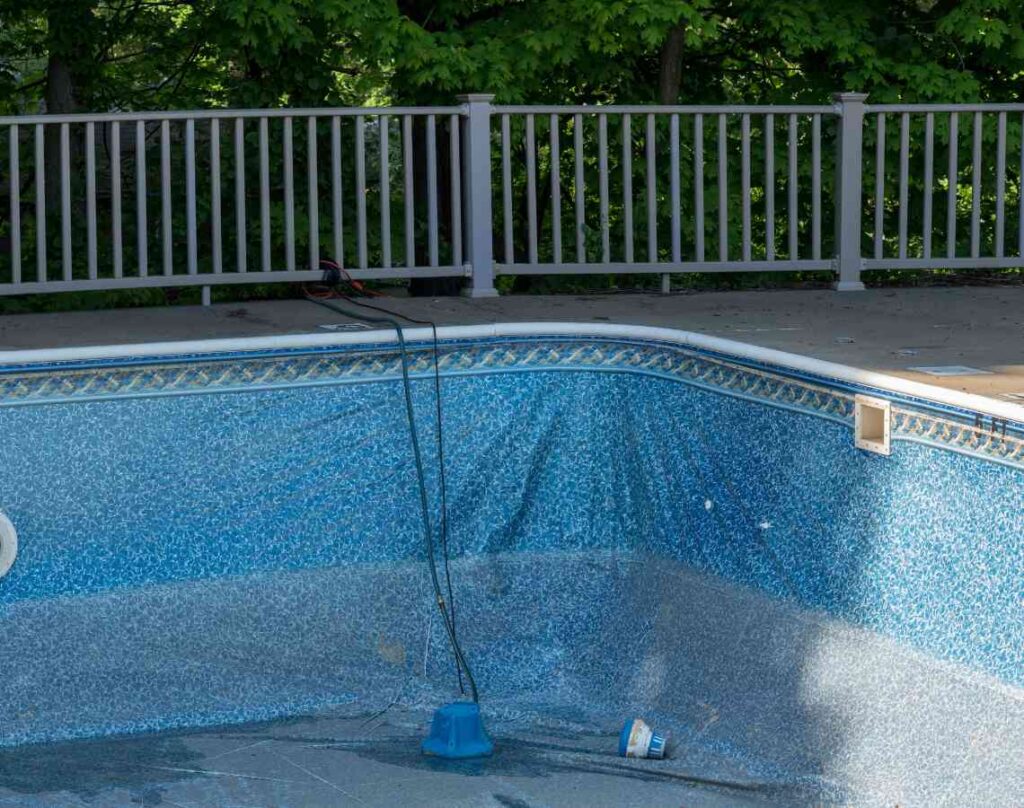
If you’re a pool owner, you need to be aware of the telltale signs of pool damage that may require immediate attention. One of the most common signs is a pool crack. These cracks can occur due to various reasons such as ground shifting, freeze-thaw cycles, or poor construction. It’s important to note that even a small crack can lead to significant water leakage, which can result in costly repairs and water wastage.
To identify a pool crack, start by inspecting the surface of your pool. Look for any visible cracks or fractures in the pool walls or floor. These cracks may appear as hairline fractures or more significant gaps, depending on the severity of the damage. Additionally, you may notice water seeping through the crack or a sudden drop in water level, indicating water leakage.
If you suspect a pool crack or notice any signs of water leakage, it’s crucial to seek professional help immediately. Pool cracks can worsen over time, leading to further damage and potential safety hazards. A professional pool technician will have the expertise to assess the extent of the damage and recommend the appropriate repairs. Remember, addressing pool cracks and water leakage promptly can save you from more significant problems down the line.
Complex Equipment Repairs
For complex equipment repairs, it is best to rely on the expertise of professional pool technicians. When it comes to maintaining your pool, certain tasks require specialized knowledge and skills. Equipment replacement and water treatment are two areas where it is essential to call in the pros.
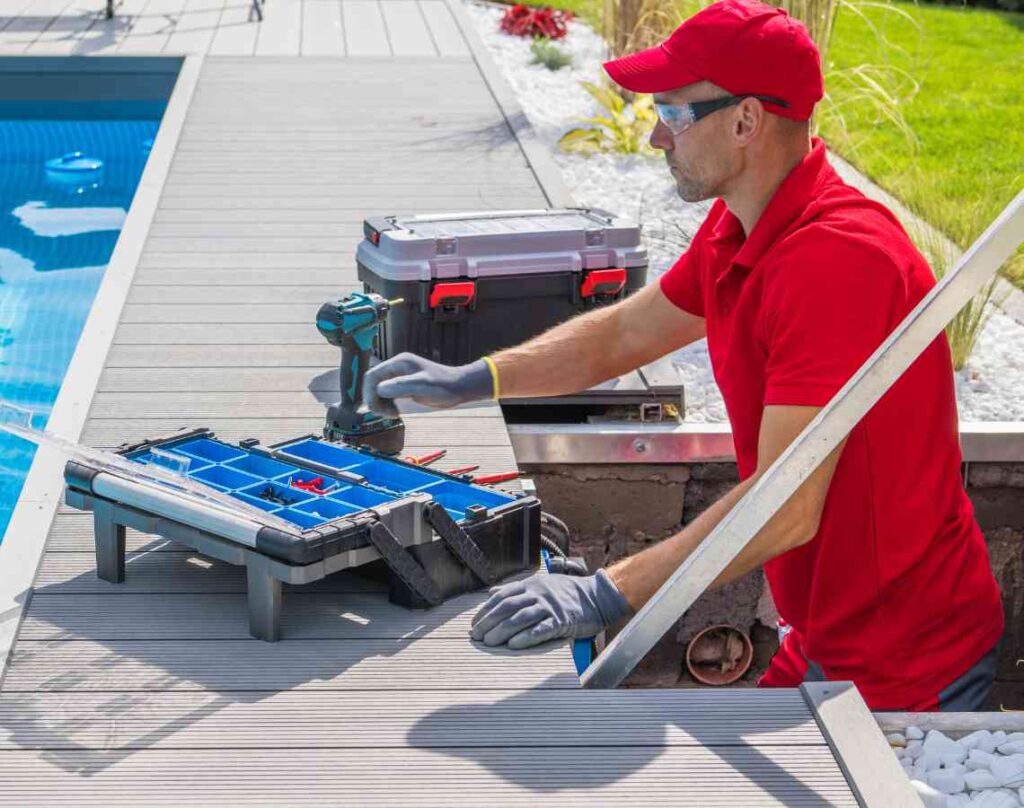
Pool equipment, such as pumps, filters, and heaters, plays a crucial role in keeping your pool clean and functioning properly. Over time, these components can wear out or become damaged, leading to decreased performance or even complete failure. Attempting to repair or replace these complex pieces of equipment without the necessary expertise can result in further damage or even personal injury.
To highlight the importance of professional assistance for complex equipment repairs, consider the following table:
| Task | Description | Importance |
| Equipment Replacement | Replacing worn-out or damaged pool equipment, such as pumps, filters, and heaters. | Vital for maintaining proper pool functionality and water quality. |
| Water Treatment | Implementing the correct chemicals and treatments to ensure balanced and safe pool water. | Essential for preventing algae growth, maintaining water clarity, and protecting swimmers’ health. |
Professional pool technicians have the knowledge and experience to accurately diagnose equipment issues and determine the most appropriate solutions. They also have access to specialized tools and replacement parts that are not readily available to the average pool owner.
Chemical Balancing Challenges
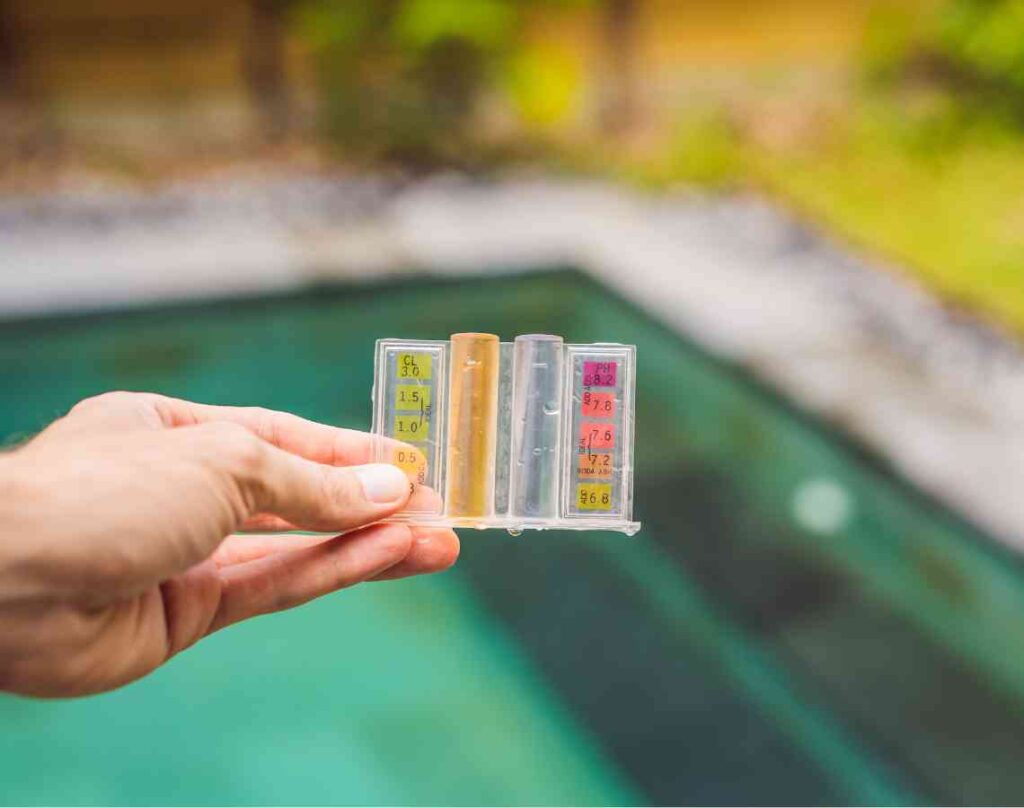
When it comes to maintaining your pool, one of the most challenging aspects is achieving and maintaining proper chemical balance. Chemical balancing is crucial because it ensures that your pool water is clean, safe, and comfortable for swimming. However, many pool owners make common mistakes when attempting to balance the chemicals themselves, which can lead to serious DIY risks.
One of the most common mistakes is adding too much or too little chemicals. Achieving the right balance of chlorine, pH, alkalinity, and other chemicals requires careful measurement and precise calculations. Adding too much chlorine, for example, can lead to skin and eye irritation while adding too little can result in the growth of bacteria and algae. Similarly, improper pH and alkalinity levels can cause corrosion, scaling, and cloudy water.
Another DIY risk is not regularly testing the water. Pool water chemistry can change rapidly due to factors such as weather conditions, usage, and contaminants. Without regular testing, it is difficult to know if the chemical balance is within the recommended range. This can result in the inefficient use of chemicals and ineffective water treatment.
To avoid these risks, it is best to leave the chemical balancing of your pool to the experts. Pool maintenance professionals have the experience, knowledge, and tools to ensure that your pool water is properly balanced at all times. They can perform regular water testing, make necessary adjustments, and provide recommendations for maintaining optimal chemical balance.
Structural and Plumbing Issues
Pool maintenance experts are well-equipped to identify and address any potential structural and plumbing issues that may arise in your pool. Regular structural inspections are crucial to ensure the safety and integrity of your pool. These inspections involve assessing the pool’s foundation, walls, and deck for any signs of damage or deterioration. By detecting issues early on, experts can prevent costly repairs and ensure your pool remains in optimal condition.
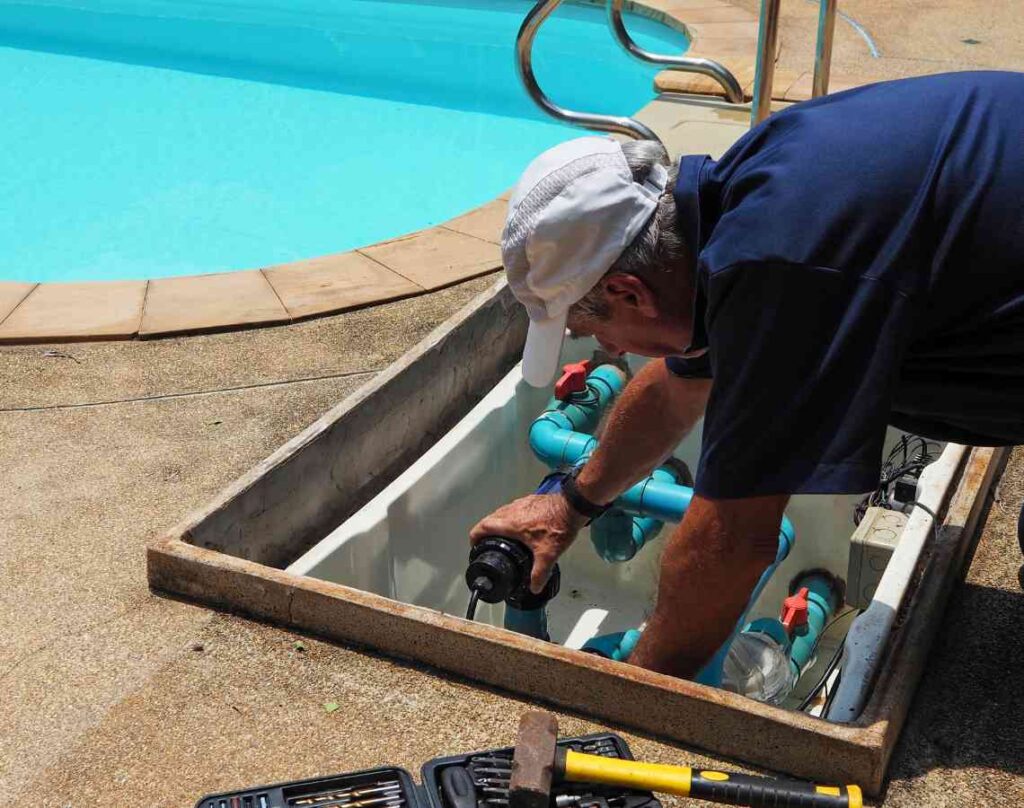
When it comes to plumbing repairs, professionals have the knowledge and expertise to handle any plumbing-related problems in your pool system. From leak detection and repair to fixing clogged pipes and malfunctioning valves, they can efficiently diagnose and resolve plumbing issues. Ensuring proper water circulation and filtration is essential for maintaining water quality and preventing the growth of bacteria and algae.
To give you an idea of the types of structural and plumbing issues that may arise in your pool, here is a table outlining some common problems and their potential causes:
| Issue | Potential Cause | Solution |
| Cracks in pool walls or floor | Settling of soil, ground movement, or aging | Repair cracks using appropriate sealants and materials |
| Leaking pipes or fittings | Wear and tear, improper installation | Locate and repair leaks, replace faulty components |
| Poor water circulation or filtration | Clogged filters, malfunctioning pump or motor | Clean or replace filters, repair or replace equipment |
Advanced Cleaning and Filtration Techniques
To ensure your pool maintains optimal condition, experts in pool maintenance employ advanced cleaning and filtration techniques to effectively remove contaminants and maintain water clarity. These techniques involve the use of various water treatment methods and professional pool cleaning techniques.
One of the primary methods used in advanced pool cleaning is the use of high-efficiency pool filters. These filters are designed to remove even the smallest particles from the water, ensuring that it stays clean and clear. By using a combination of sand, diatomaceous earth, or cartridge filters, professionals can effectively trap and remove debris, dirt, and other contaminants.
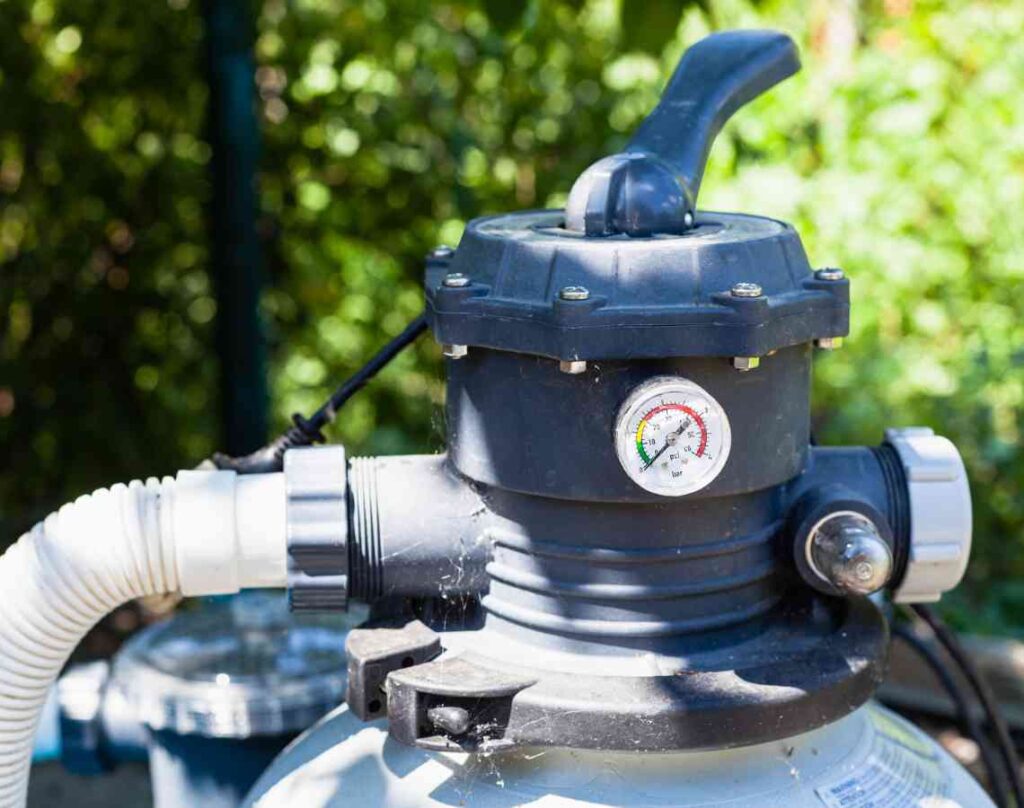
In addition to filtration, experts also utilize water treatment methods to ensure the pool water remains safe and free from harmful bacteria and algae. Chlorination is a common method used to disinfect the water and kill any potential pathogens. Professionals carefully measure and regulate the chlorine levels to maintain a healthy balance without causing any harm to swimmers.
Another advanced cleaning technique employed by experts is the use of robotic pool cleaners. These automated devices are equipped with brushes, scrubbers, and vacuum systems that can efficiently clean the pool walls, floor, and surface. They are programmed to navigate the pool and remove dirt, leaves, and other debris, reducing the need for manual cleaning.
Need professional pool help? Contact us!
Frequently Asked Questions
What Are Some Common Pool Maintenance Tasks That Homeowners Can Handle on Their Own?
You can handle common pool maintenance tasks on your own, such as pool cleaning and pool skimming. These tasks require attention to detail and technical expertise, but with the right knowledge, you can successfully maintain your pool.
How Often Should Pool Owners Test and Adjust the Chemical Levels in Their Pools?
You should test and adjust the chemical levels in your pool regularly to maintain a healthy and safe swimming environment. The frequency of pool maintenance depends on factors such as usage, weather conditions, and water quality. It is crucial to maintain a proper chemical balance to prevent issues like algae growth or skin irritation.
What Are Some Indicators That a Pool May Have Structural or Plumbing Issues?
If you notice cracks in the pool walls, leaks in the plumbing, or water level fluctuations, these could indicate structural or plumbing issues. It’s best to call the pros to assess and fix these problems.
Can You Provide Some Tips for Maintaining the Pool’s Filtration System?
Maintaining your pool’s filtration system is crucial for clean and clear water. Regularly clean the skimmer and pump baskets, backwash the filter, and keep an eye on water pressure. These simple tips will help you avoid expensive repairs.
Are There Any Specific Safety Precautions Homeowners Should Take When Attempting Pool Maintenance Tasks?
When attempting DIY pool maintenance, it’s crucial to prioritize safety precautions. From wearing protective gear to ensuring proper ventilation, taking these measures can prevent accidents and injuries while you maintain your pool.

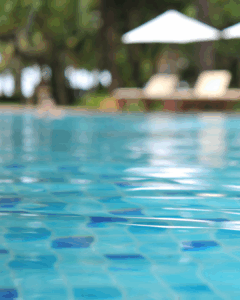

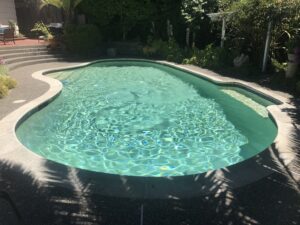
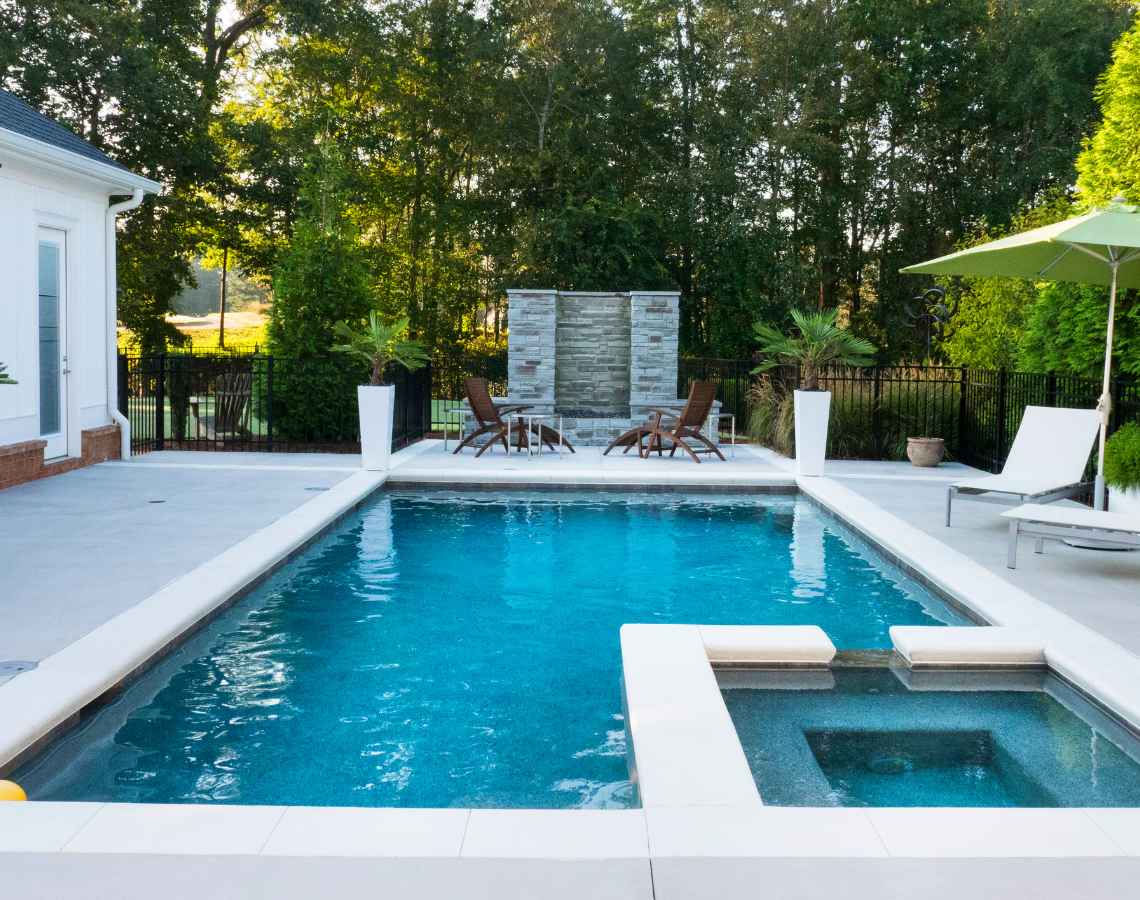

 Alex Cota
Alex Cota  Sophie Pekic
Sophie Pekic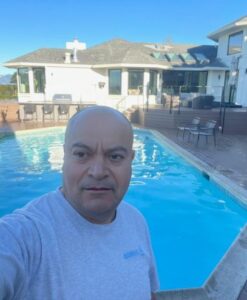 Rudy Reyes
Rudy Reyes  Mark Harlan
Mark Harlan Kevin Hall
Kevin Hall 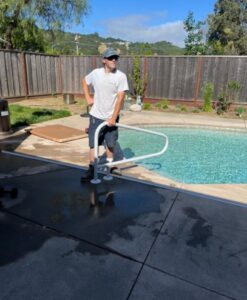 Howard (Howie) Van Lare
Howard (Howie) Van Lare  Chris Cavalerro
Chris Cavalerro 

 Betty Garmendina
Betty Garmendina George Wallace
George Wallace Zach Zastrow
Zach Zastrow Jorge Salazar Bernal
Jorge Salazar Bernal Mike Watson
Mike Watson Jane Ciuchta – Hired 2015
Jane Ciuchta – Hired 2015 Bruce Muir – Hired 2020
Bruce Muir – Hired 2020 David-Metzger – Hired 2014
David-Metzger – Hired 2014 Robin Clarke – Hired 2019
Robin Clarke – Hired 2019 Maddi Davidson – Hired 2022
Maddi Davidson – Hired 2022 John Albachten – Hired 2015
John Albachten – Hired 2015 Jay Bergmann – Hired 2023
Jay Bergmann – Hired 2023 Summer Venegas – Hired 2017
Summer Venegas – Hired 2017 Rebecca Jones – Hired 2015
Rebecca Jones – Hired 2015 Jane Doe – Hired 2014
Jane Doe – Hired 2014